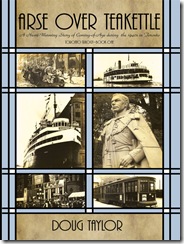The novel “Arse Over Teakettle,” the first book of “The Toronto Trilogy,”details the tragic burning of the ship “The Noronic,” at pier nine on the Toronto waterfront, where 122 persons lost their lives. The book is a story of a family struggling to survive in Toronto during the Second World War and the postwar period. The Noronic Disaster is included in the tale. Young Tom Hudson, the central character of the book, is deeply affected by the news of the burning ship. The reader views the event through Tom’s eyes.
The following quote is from “Arse Over Teakettle.”
On that fateful morning of 17 September in 1949, when I arrived downstairs for breakfast, my mother was listening to the eight o’clock news. I did not pay much attention, as I was more concerned with the day ahead—Saturday was mine, free of school. However, my mom’s shocked reaction soon drew my attention to the voice of the newscaster. Within a few seconds, I realized that he was reporting about a ship in the Toronto harbour, which over-night had caught fire. I listened intently to the details.
Passengers awakened during the darkened hours and discovered the ship ablaze. They attempted to exit the vessel through the smoke-filled hallways, but flames blocked their path. Porthole windows were smashed as people attempted to escape the intensity of the heat. Some were crushed in the panic. Many of those that reached the decks were prevented from escaping ashore, as the decks were engulfed in flames. A few were seen climbing down hawser ropes or leaping into the water below. The screams and cries of the dying haunted the grim-faced firefighters as they attempted to rescue as many as possible. The heat from the metal hull was so intense that decks collapsed. It was a blazing inferno beyond imagination. It is feared that the death toll may reach over a hundred.
When the Toronto Fire Department arrived, the flames were leaping over a hundred feet into the air and smoke was billowing from the portholes. They employed several high-pressured pumper trucks, a rescue squad, and an aerial truck. The Toronto fireboat was on the scene,
along with numerous ambulances and emergency vehicles. Hoses poured water high into the air. The first rescue ladder, which had been extended to the C-deck, broke in two under the weight of the panic-stricken passengers. A dozen people plunged to the water below, many grasping the broken pieces of the ladder to stay afloat.
As the ship increasingly filled with water, it slowly listed toward the pier, forcing firefighter to retreat. At one point, they thought it might keel over as it leaned on a 45 degree angle. Finally, the hull floated upright again, and the hoses continued to pour water into the ship. The fire was finally extinguished around 6 a.m., but the smoldering hull was too hot to enter. It will be several hours before they can commence the grim task of recovering bodies.
During Saturday morning, the horrifying news washed over the city, creating a flood of despair. At lunchtime, my mom sent me to the grocery store next door to our house to purchase a loaf of bread. I over-heard customers discussing the tragedy. Words were few, and spoken in hushed tones. This was not a catastrophe in a far-away land, where distance isolated people from the reality of the situation. The ship was in the Toronto harbour, and toxic fumes and black smoke had drifted over the downtown area.
I heard a woman say, “The tragedy is a reminder to all of us of the fragility of life.”
I had only a vague idea what she meant, but I detected the fear in her voice. Another woman was concerned for her brother, a member of the crew. She had received no word concerning his safety.
Harry the butcher working busily behind the meat counter, said that children were among the victims. He had heard that the body of a young girl had been found, her arms out-stretched as if in prayer, a calm expression on her face. Another child, a boy, had been discovered, his body crouched in a fetal position, as if attempting to protect himself from the suffocating smoke. They had been accompanying their parents on a late-summer holiday. They would never again enter a classroom, such as the one I attended each school day. This struck me in the pit of my stomach. It was as if the tragedy at the waterfront had invaded my neighbourhood, eroding my sense of security. When I returned home from the store, it was reassuring to see my mom in the kitchen, preparing soup for lunch. For me, life would continue, but I knew that other families would not be so fortunate.
The first two books of the Toronto trilogy are available by following the links:
Arse Over Teakettle: http://bookstore.iuniverse.com/Products/SKU-000132634/Arse-Over-Teakettle.aspx
The Reluctant Virgin : http://bookstore.iuniverse.com/Products/SKU-000188306/The-Reluctant-Virgin.aspx
The book “The Reluctant Virgin”is also available at any Chapters/Indigo store.
To view the author’s Home Page: https://tayloronhistory.com/
